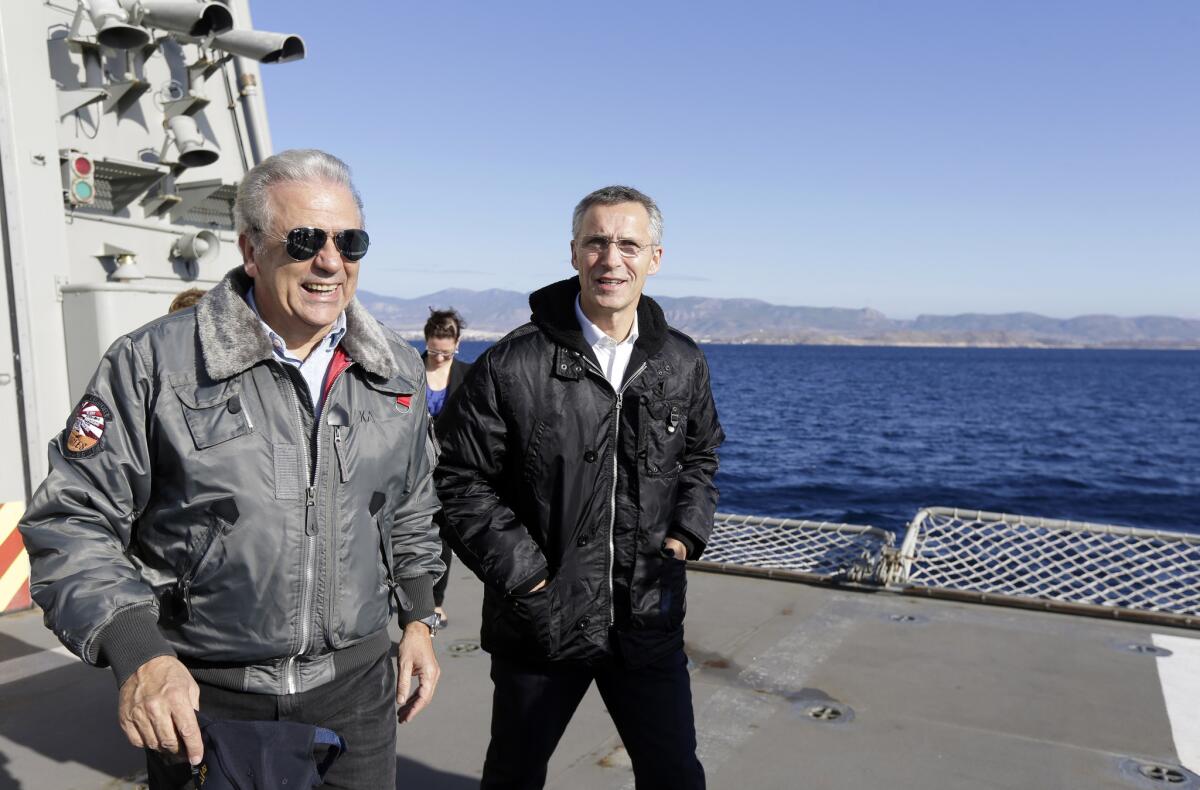Greece, Turkey at odds over fuel reserves in Mediterranean

- Share via
Reporting from Athens — About 20 years ago, a blip in the centuries of bad blood between them, NATO allies Greece and Turkey came to the brink of war over conflicting claims to an arid Aegean isle inhabited solely by goats, rabbits and sheep.
Now, after a sudden burst of business and friendly relations helped thaw generations of animosity, Greece and Turkey are at it again, this time, trading threats over claims to oil and gas reserves in the eastern Mediterranean.
No other North Atlantic Treaty Organization neighbors have seen relations fraught with so much tension and mistrust. And as Espen Bard Elder, a senior United Nations troubleshooter, warned recently during a trip to Athens, “This has all got to stop.”
“What’s happening right now is actually quite dangerous and I encourage everyone to do their best to avoid any kind of further escalation,” Elder said.
Concern is growing in the United States and Europe that the energy-rich eastern Mediterranean will become a new hot spot near an already-volatile region: the Middle East.
Tension first flared last month when Turkey, at political odds with most of its regional neighbors, including Israel, Cyprus and Egypt, sent a research vessel and two frigates into disputed waters south of war-divided Cyprus to chart natural gas deposits as part of a naval exercise in the eastern Mediterranean.
The Greek Cypriot government, which Ankara, the Turkish capital, refuses to recognize after seizing the island’s northern Turkish enclave in a 1974 invasion, suspended United Nations-sponsored reunification talks in retaliation. It also teamed up with energy-hungry Egypt and its sister state, Greece, to further probe exploration rights in the eastern Mediterranean, enraging Turkey, a major energy hub that wants to become the region’s paramount power.
“Whatever its aspiration,” said Costas Fillis, a research director at the Athens-based Institute of International Relations, “no single nation is going up to bat for Turkey these days. That means it is feeling the heat of isolation. So, rather than see itself miss out on any direct gains [from drilling in the region], it prefers to behave like a spoilsport blocking any energy cooperation among its adversaries.”
It also means that Turkey is “playing it safe, preferring to pick on Greece and Cyprus, both cash-strapped, and age-old foes,” Fillis explains, “than [on] any of their energy partners, Israel and Egypt,” both key U.S allies.
Last week, as Greece and Turkey engaged in a sudden surge of aerial encounters and gunboat pursuits in the Aegean, the Turkish frigate Barbaros sailed deeper into Greek Cypriot waters with new rules of engagement. Turkey’s naval commander, Adm. Bulent Bostanoglu, warned that the new rules would be applied against “any reaction from Greek and Israeli ships” patrolling the region.
“Bring it on,” Greek navy officials are said to have responded in Athens. “We, too, have been given fresh rules of engagement.” The European Union, meanwhile, warned Ankara that it was violating Cyprus’ sovereignty.
U.S. officials have sought to avoid taking sides publicly, instead focusing on efforts to enlist Turkey in an international coalition against the militant group Islamic State in Syria and Iraq.
But as tension rose, putting the Houston-based Noble Energy drilling off Israel and Cyprus in the firing line, Washington last week made a sharp about-face, with its top diplomat in Cyprus publicly pointing out to Turkey “that it was best for it to pull back the Barbaros, call off its naval exercise [in the region] … and return to the negotiating table” to resume Cyprus peace talks.
Turkey did not publicly respond.
Since the 2010 discovery of a giant gas field off Israel, countries in the region, including Cyprus, Turkey, Israel, Egypt, Lebanon and Greece, have been jockeying for control of the resources.
“The region is a gold mine, an El Dorado of oil and gas,” says Antony Foskolos, a leading researcher at the Geological Survey in Canada. “The greater area has a capacity of about 500 trillion cubic feet when Canada, the U.S. and Mexico together have 350 tcf.”
Faced with such profitable prospects, Egypt, struggling with its worst energy crisis in decades, has already signed a deal with Cyprus charting sea boundaries between the two countries for the purpose of commercial exploitation. Israel has done the same with the island republic; Greece will soon follow suit, hoping to press ahead with designs to funnel Cypriot and Israeli natural gas to Western Europe without Turkish permission.
How soon that could happen remains unclear. But with global demand for gas expected to jump by more than 50% over the next 20 years, according to the International Energy Agency, an intergovernmental policy-coordinating and advisory body based in Paris, such “pipeline designs serving as supplementary conduits of energy to Europe make absolute sense,” Foskolos says.
So, also, does the prospect of generating revenue that could wipe out the crippling debts of Greece and Cyprus, both heavily reliant on rescue loans given by European and international creditors in exchange for brutal budget cuts to fix their broken economies.
Greek officials put their untapped energy reserves at $750 billion. Cyprus estimates its plots at $1 trillion and Egypt around $2.2 trillion. Cyprus has already licensed energy giants including Noble, Italy’s Eni and France’s Total to drill in one of its 17 offshore fields.
This year, the abundance of money-making reserves pushed Greek and Turkish Cypriots to resume peace talks, hoping that a 10-year hiatus could be broken with a breakthrough in the West’s longest-running diplomatic dispute. Vice President Joe Biden even stepped in, visiting the island to prod both sides to sign a peace deal that could “seal stability” in the eastern Mediterranean.
If only it were so simple.
Peace talks have floundered and the energy dispute has rekindled the Greek-Turkish rivalry.
To defuse the situation and potentially jump-start Cyprus’ peace talks, Greek Prime Minister Antonis Samaras and his Turkish counterpart have agreed to meet in Athens in early December. Washington’s involvement may be needed.
“It’s obvious that neither side wants this crisis to spiral out of control,” Fillis says. “But so long as this volatile situation continues and Ankara keeps the Barbaros in Cyprus’ waters — even after the end of its naval exercise on Dec. 30 — the greater the chance of something going terribly wrong.”
Carassava is a special correspondent.
More to Read
Sign up for Essential California
The most important California stories and recommendations in your inbox every morning.
You may occasionally receive promotional content from the Los Angeles Times.










